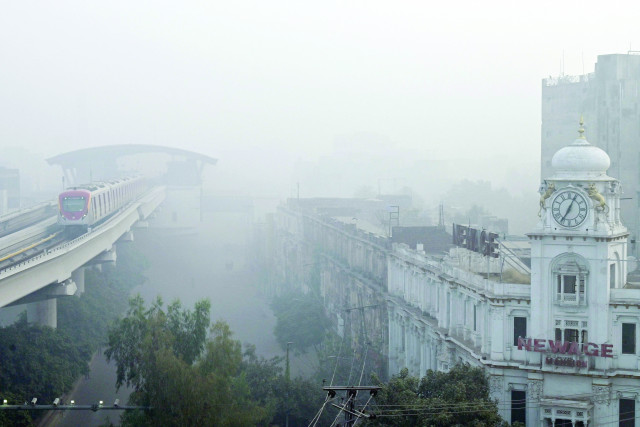Smog continues to choke Lahore
Govt claims progress, but air pollution levels show little improvement over the past year

The Punjab government has taken more organized steps this year compared to previous years to reduce air pollution. An Environmental Protection Force has been established, and a monitoring and forecasting system has also been introduced using modern technology. Experts, however, claim that despite these efforts, there has been no significant improvement in Lahore’s air quality.
Statistics show that Lahore's average Air Quality Index (AQI) in 2024 was 126. The levels peaked in January at 202, followed by 142 in February, 104 in March, 101 in April and May. A notable drop was recorded in June and July, at 57 and 67 respectively. In August, the AQI was 68, but it rose again to 143 in September. October recorded 163, November 184, and December saw the AQI reach 178.
The first nine months of 2025 have also shown discouraging trends in air pollution. The average AQI in January was 178, followed by 142 in February, 116 in March, 130 in April, and 95 in May. The AQI further declined in June to reach a level of 88, followed by a further drop to 86 in July, 79 in August and 84 in September.
These figures indicate that although January and February 2025 were comparatively better, air quality from March to August was worse than the same period in the previous year. Only in September 2025 was there improvement, with an average AQI of 84, compared to 143 in September 2024.
Experts acknowledge that the government's initiatives are positive, but most of them are short-term in nature. Until a sustainable and long-term policy is adopted, the results will not be satisfactory. Environmental expert Aleem Butt shared similar reservations.
“There has been no development of infrastructure for electric transport, no policy to promote green energy in industries, nor have any tax incentives been offered. Measures like water cannon spraying can have immediate effects, but real results will only emerge after five to six years,” claimed Butt.
Read More: After deluge, smog looms over Punjab
Director General of the Punjab Environmental Protection Department, Dr Imran Hamid, opined that eliminating air pollution or smog immediately was not possible. “The best example in the world is China, which spent billions of dollars over ten years to improve air quality. We cannot resolve the smog crisis alone. Other South Asian countries in the region need to work together,” said Dr Hamid.
On the other hand, Butt emphasized that in order to permanently improve Lahore's air quality, the government must adopt a strategy that ensures long-term implementation of sustainable transport, green energy, and strict environmental regulations.
“During last year’s smog, the AQI reached as high as 1,500, mainly due to climatic effects. This year too, climate change must be considered. For the first time in Pakistan, an Air Quality Forecasting System has been launched, which makes it possible to predict air quality seven days in advance. During the smog season, checkpoints and preemptive measures will be taken to control pollution,”



















COMMENTS
Comments are moderated and generally will be posted if they are on-topic and not abusive.
For more information, please see our Comments FAQ